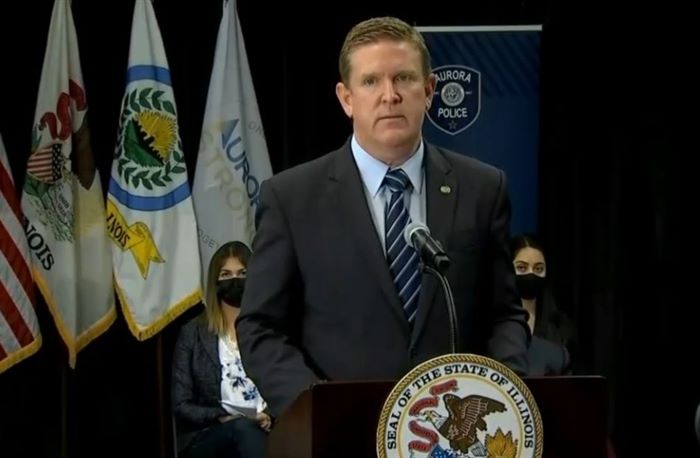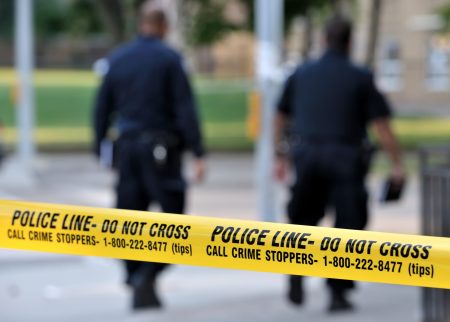(Credit: Blueroomstream.com)
By JERRY NOWICKI
Capitol News Illinois
Within five miles of the scene of a 2019 workplace mass shooting that left six people dead and five law enforcement officers injured, Gov. JB Pritzker signed a wide-ranging bill reforming the state’s gun laws Monday at the Aurora Police Department.
Advocates for the new law – including Illinois State Police Director Brendan Kelly – hailed it as a measure that would provide the statutory backing and funding necessary to retrieve guns from those with revoked Firearm Owners Identification cards, while also streamlining the application and renewal process for law-abiding gun owners.
“I will never forget those images, nor will I ever forget the look in the eyes of the officers of the Aurora PD. I will forever live with the scars of that day,” Kelly said during the bill signing Monday, speaking of the Aurora shooting. “Nor can any of us forget the weaknesses in the firearm safety system that were exposed.”
Kristen Ziman, police chief in Aurora, recalled how the community was “ripped apart” by the shooting at Henry Pratt Company, calling it the “defining moment” in her career ahead of her scheduled retirement at the end of the week.
“What has kept me up at night since that horrific day is that the shooter used a gun he never should have had. He used that gun to steal these precious lives,” she said. “He had a revoked FOID card, which should have rendered him unable to continue owning a firearm, but a broken system caused the revocation to fall through the cracks.”
Her officers “immediately began working with lawmakers” to try to fix the system, she said.
Following the shooting, Kelly began a push to seek what he called “modernization” of the FOID system, while ISP also began serving more firearms enforcement details – more than 450 since the shooting, “with over 1,300 prohibited persons placed directly in compliance,” according to Kelly.
Kelly said those actions were made possible by stable state government budgets, and the pace of revocations could be accelerated with the new law’s dedicated revenue streams for those actions.
The new law, which was supported by gun reform advocates while the Illinois State Rifle Association remained neutral, creates a number of changes to gun statutes, including:
- Within 90 days of the bill’s Jan. 1, 2022, effective date, State Police must create a “prohibited persons portal” to track people who have had their cards revoked or suspended. Law enforcement agencies, state’s attorneys and the attorney general would have access to that portal.
- The bill also requires ISP to establish the Violent Crime Intelligence Task Force to aid in enforcement of FOID card revocation or suspension enforcement. The task force would “conduct enforcement operations” for those with suspended or revoked licenses, with a priority on individuals “presenting a clear and present danger to themselves or to others,” according to the bill.
- The $10 renewal fee for FOID cards will remain the same under the law, but beginning in 2022 half of it will go to the State Police Firearm Services Fund which oversees applications and renewals, and half to the State Police Revocation Enforcement Fund. Previously, $6 of that fee went to the state Fish and Wildlife fund while $3 went to the Firearms Services Fund and another $1 went to the State Police Services Fund.
- FOID card applicants would not be required to submit fingerprints, but if they do, or they share with the Illinois State Police the fingerprints they filed to receive their Concealed Carry License, they would be eligible for automatic renewal without a renewal fee, provided they purchased a gun sometime within the 10-year period between renewals and passed the ISP background check in the process. That process is to be established by 2023.
- Starting in 2024, private sellers will either have to work with federal licensees, paying a fee not to exceed $25, or with ISP to “determine the validity” of the purchaser’s Firearm Owners Identification card “under state and federal law including the National Instant Criminal Background Check System.” Buyers would have to submit a record of the transfer to a federal firearm license dealer within 10 days of receiving the gun.
- Beginning in January 2022, State Police must develop a stolen gun database through which potential buyers may search the serial number of a gun to determine whether it is stolen.
- The measure also requires the State Police to monitor state and federal databases for residents charged with firearm-related crimes and to correlate the records with FOID and Concealed Carry Licenses to identify individuals who should not be allowed to own a gun.
- The bill also creates a FOID Card Review Board to consider appeals on denied or revoked cards.
- The bill also authorizes ISP to produce an electronic FOID and Concealed Carry License, allows the agency to provide a single card for FOID and CCL, and would update FOID and CCL renewal dates to be the same for one cardholder.
The state’s concealed carry law directs funding to a state Mental Health Reporting Fund, and the new law stipulates that if there is a surplus in the fund, half will go to community-based mental health programs aimed at reducing gun violence, and half will go to award grants that use and promote the National School Mental Health Curriculum model for school-based mental health support, integration, and services.








